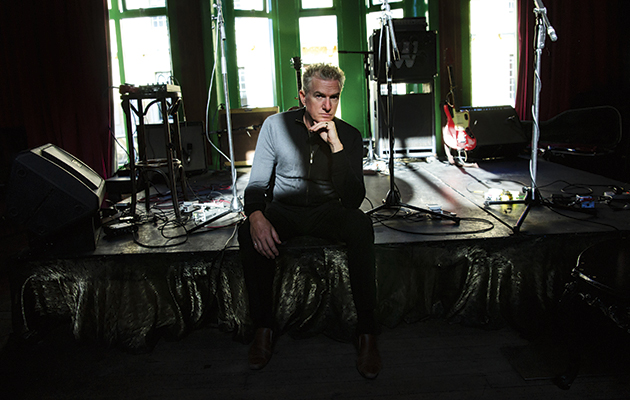Crime And The City Solution
Paradise Discotheque
Mute, 1990
Harvey’s other band, fronted by Simon Bonney, head to the German countryside for their fourth album.
“Paradise Discotheque was done out at Conny Plank’s studio in West Germany. I can’t really remember the earlier Crime albums that clearly. It always felt like we were struggling to try and get it up and running fully, in terms of the concept of the band. But by this point, we were touring a lot on the Continent and this Berlin lineup of the band did really well – certainly artistically. By the time we went to record at Conny’s, we had a strong idea of what we were trying to do. It was almost like a concept album in a way. The big ‘four-part’ suite – crazy, really. It was a creative environment, and we had a lot of fun working together. Simon would usually come up with the lyrics, then mostly it was either Alex [Hacke, guitar] or myself who would present the foundation piece of music. It was a very interesting band, an unusual collective of people. But I’d taken on a bit too much, being in what was effectively two full-time bands. I was burning the candle at both ends. I was also doing a lot of the management stuff for both bands as well, which was just as well in terms of organising touring, otherwise it would have been a complete nightmare! I should have just stuck with the Bad Seeds, I guess, and done bits and pieces on my own. It meant that I didn’t work on any of my own things for a long time, because I was so caught up with the two full-time bands. No time for a personal life either, it was kind of ridiculous. But I don’t regret what we managed to do artistically.”
__________________________
Nick Cave & The Bad Seeds
Let Love In
Mute, 1994
The group’s majestic eighth album, featuring what has become one of Cave and Harvey’s most famous songs, “Red Right Hand”.
“We decided we really needed to make a focused and strong Bad Seeds album – what we knew we were capable of. We recorded in a really good studio, whereas [1990’s] The Good Son was recorded in São Paulo at a kind of advertising studio, and then [1992’s] Henry’s Dream was at [Los Angeles’] Sound City, which is a real rock studio. I think that really compromised the overall sound, ’cos a lot of the time with the Bad Seeds it’s about atmospheres and moods. For Let Love In we recorded at Townhouse 3 in Battersea, a big converted church, with a fantastic sound. We got back on top of our own production, having learnt from a few mistakes… our previous couple of albums [laughs]! Let Love In is more like a classic Bad Seeds album because the sound is large. “Red Right Hand” is an odd one, ’cos it came out of a jam during some demo-recording in Melbourne. I think Nick, myself and Thomas Wydler were there. Nick was sick of always playing C minor or G minor. His fingers always would go to the same chords on the piano. It’s a common problem. He said, “Ah, play something in a key I don’t know.” So I started playing that in B. I thought, ‘He won’t be able to find that, he won’t be able to, you know, dictate.’ It’s just a 12-bar turnaround, really. Nick didn’t really have a song, but we recorded the basic track when we recorded Let Love In and we knew what the atmosphere was meant to be. It’s just got this feel, and that’s what the Bad Seeds are capable of. “I Let Love In”, too, was a song Nick wrote in five minutes, but he didn’t feel any relationship with it, like it wasn’t important to him because he hadn’t had to struggle with it or something. It was the Bad Seeds who insisted we record it.”
_________________________
Mick Harvey
Intoxicated Man
Mute, 1995
Harvey’s first solo album, a scholarly, lushly arranged set of Serge Gainsbourg translations.
“I first got into Gainsbourg in the ’80s when I was living in Berlin. A very close friend, a French guy called Olivier, made me a 90-minute compilation tape with loads of stuff on it, which was where I heard most of that stuff for the first time. The whole idea to do an LP of translations came out of realising that most people didn’t know his work very well. I’m not a good French speaker, no! But I’ve had people helping with translations and I can see into it enough to see what’s going on there. Even if I were reasonably good at French I’d be wanting people to advise me about the more complex things going on in there, the wordplay and so on. Then it’s about moulding the words into something singable, with the rhyming and all that. For the most part, they’re very successful. I was surprised how much of it worked. I worked very hard on not compromising any aspect of the translation – you just have to keep working at it. You know, there’s dozens of possibilities with rhymes. I recorded most of this in a band format in Australia – Chris Hughes was playing drums, Dave McClymont, who was in Orange Juice, was on bass, and a guy called Robin Casinader played some of the piano. Then we recorded the strings in London with Bertrand Burgalat. I got Anita Lane to do all the female vocals, and she was the right choice for the type of thing that was going on there.”



